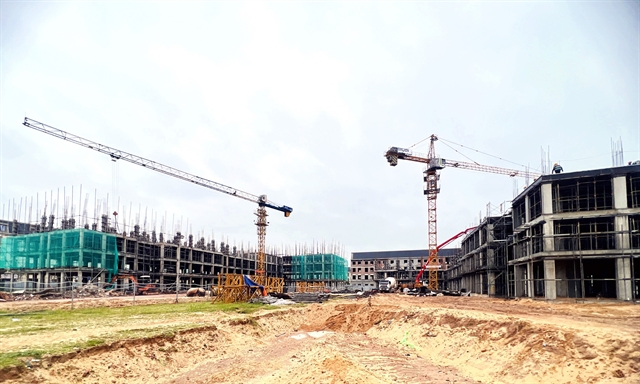 Politics & Law
Politics & Law

 |
| Police in Thanh Hóa City bust a counterfeit pharmaceutical production and trafficking ring on August 16, 2024, detaining seven suspects involved in the operation. VNA/VNS Photo |
HÀ NỘI — A Government proposal to abolish the death penalty for several criminal offences has stirred a heated debate among lawmakers, highlighting the tension between judicial reform, international integration and the demand for deterrence in the face of serious crime.
The discussion took place during a group session at the 15th National Assembly’s 9th meeting on May 20, as NA deputies reviewed a draft amendment to the Penal Code.
The Government's proposed changes would eliminate capital punishment for eight out of the 18 crimes currently eligible for the death penalty.
Life imprisonment without the possibility of a sentence reduction or parole would be applied to these crimes instead.
Offences under consideration include those related to national security such as subversive activities, espionage and sabotage as well as high-profile economic and social crimes such as embezzlement, bribery, illegal drug transportation and the production or sale of counterfeit medicines.
The proposal has divided lawmakers.
Deputy Lê Nhật Thành from Hà Nội welcomed the move, describing it as a natural progression of Việt Nam’s ongoing judicial reforms and a necessary safeguard against wrongful convictions.
He supported not only the replacement of the death penalty with life imprisonment without commutation but also the practice of not executing death-row inmates who suffer from terminal illnesses, late-stage cancer or advanced AIDS.
Thành argued that the proposed changes align with ongoing judicial reforms and help prevent wrongful convictions in criminal proceedings. He emphasised that the proposal also reflected the broader policy of the Party and State to gradually reduce the application of the death penalty.
Moreover, it supported Việt Nam’s efforts toward international integration in the judicial and criminal justice sectors and addressed existing inadequacies in how the death penalty is applied under current law.
Thành cited instances where Việt Nam’s lack of commitment to forgo the death penalty hindered judicial cooperation with other nations.
“When our foreign partners require assurances that the death sentence won’t be enforced, especially in cases involving corruption or drug crimes, our lack of a formal policy often leaves us without support,” he explained.
He also pointed out the inconsistencies in sentencing: “In many cases, the choice between life imprisonment and the death penalty lacks nuance. Based on the nature, severity and consequences of the crime, life imprisonment may seem too lenient, while the death penalty may be excessively harsh.”
Thành noted that sparing terminally ill convicts from execution would be a humanitarian measure that would also reduce the burden on legal procedures and enforcement agencies, cutting costs and easing pressure on the system.
Ultimately, replacing the death penalty with life imprisonment without parole, he argued, would not only uphold the fundamental right to life but also ensure that such offenders are permanently removed from society.
Not all deputies shared Thành’s optimism.
Deputy Thạch Phước Bình from Trà Vinh Province agreed that limiting the use of the death penalty would align with humanitarian values. However, he emphasised the need to preserve its role as a legal deterrent.
Citing international examples, Bình noted that France and Canada abolished the death penalty in 1981 and 1976 respectively, replacing it with life imprisonment. But both countries clearly regulate clemency and sentence reduction only after lengthy incarceration periods of 20 to 30 years to maintain deterrence.
He also pointed to China, which retains one of the world’s highest execution rates. Since 2011, China has removed capital punishment for various economic crimes, but tightened enforcement of strict sentencing policies, allowing sentence reductions or commutation to life imprisonment only under rigorous conditions and good behaviour.
The proposal’s most contentious aspect, however, lies in its treatment of drug trafficking.
Deputy Nguyễn Hải Trung from Hà Nội strongly opposed eliminating the death penalty for this offence.
“Whether it's a few grammes or a few tonnes, the harm caused by drug transport is immense,” he said, calling for more granular sentencing but insisting that the most serious cases must still be met with capital punishment.
He also called for prosecuting drug users, citing their role in fuelling other violent crimes like theft and murder.
 |
| Customs officers at HCM City's Tân Sơn Nhất International Airport inspect a shipment of narcotics hidden inside toothpaste tubes that were seized from the luggage of four flight attendants on March 17, 2023. VNA/VNS Photo |
Deputy Nguyễn Thành Trung from Yên Bái Province echoed concerns about the complex and transnational nature of Việt Nam’s drug crime landscape, which he said was becoming increasingly sophisticated.
While he did not oppose reducing the use of the death penalty in principle, he urged that it remain in place for especially serious cases such as repeat offenders, large-scale trafficking and organised criminal operations.
HCM City deputy Nguyễn Thanh Sang agreed, stating that removing the death penalty for drug trafficking could turn Việt Nam into a transit hub for narcotics.
He warned that such a move would send the wrong signal at a time when drug cases were rising despite existing harsh penalties.
Sang also expressed concern over the fight against corruption, arguing that the threat of the death penalty had helped law enforcement secure cooperation and recover assets from high-profile defendants.
Referencing the Vạn Thịnh Phát case and the asset recovery efforts of defendant Trương Mỹ Lan, Sang posed a critical question: “If these individuals knew they wouldn’t face the death penalty, would the outcome of asset recovery efforts be the same?”
Sang ultimately opposed completely abolishing the death penalty for all eight proposed offences.
One offence, in particular, has drawn near-universal condemnation: the production and sale of counterfeit medicine.
Though this crime has never before warranted the death penalty in Việt Nam, recent developments have prompted many NA deputies to reconsider. Widespread fake drug operations have surfaced, threatening public health on a massive scale and exploiting the vulnerable.
“This is not just fraud. It’s exploitation of the sick and dying,” said Deputy Nguyễn Thanh Sang. “We must seriously consider introducing the death penalty as a deterrent.”
Echoing this stance, Deputy Phạm Khánh Phong Lan from HCM City criticised the proposal to remove the death penalty for crimes such as drug trafficking, counterfeit medicine production and corruption, calling it inappropriate given current realities.
“If there were signs these crimes were decreasing, we might reconsider. But in fact, drug-related crimes are becoming more severe, fake medicines are being discovered with increasing frequency and corruption remains deeply entrenched,” she said.
Lan argued that invoking humanitarian grounds to replace capital punishment with life imprisonment is misguided. She emphasised a principle of proportional justice, stating: “For murder, life must be paid with life.” She urged lawmakers to consider the families of the victims.
Drawing a stark comparison, Lan added: “A bad doctor might harm a patient. But a pharmacist producing fake medicine could kill dozens, if not hundreds. This is a crime devoid of conscience. Such individuals don’t deserve leniency. The death penalty must stay.”
As the debate continues, Việt Nam’s lawmakers face a difficult balancing act between compassion and deterrence, reform and public security, international norms and domestic realities.
The reviewing committee has largely agreed on the proposed timeline, with the revised Penal Code expected to take effect from July 1. — VNS




